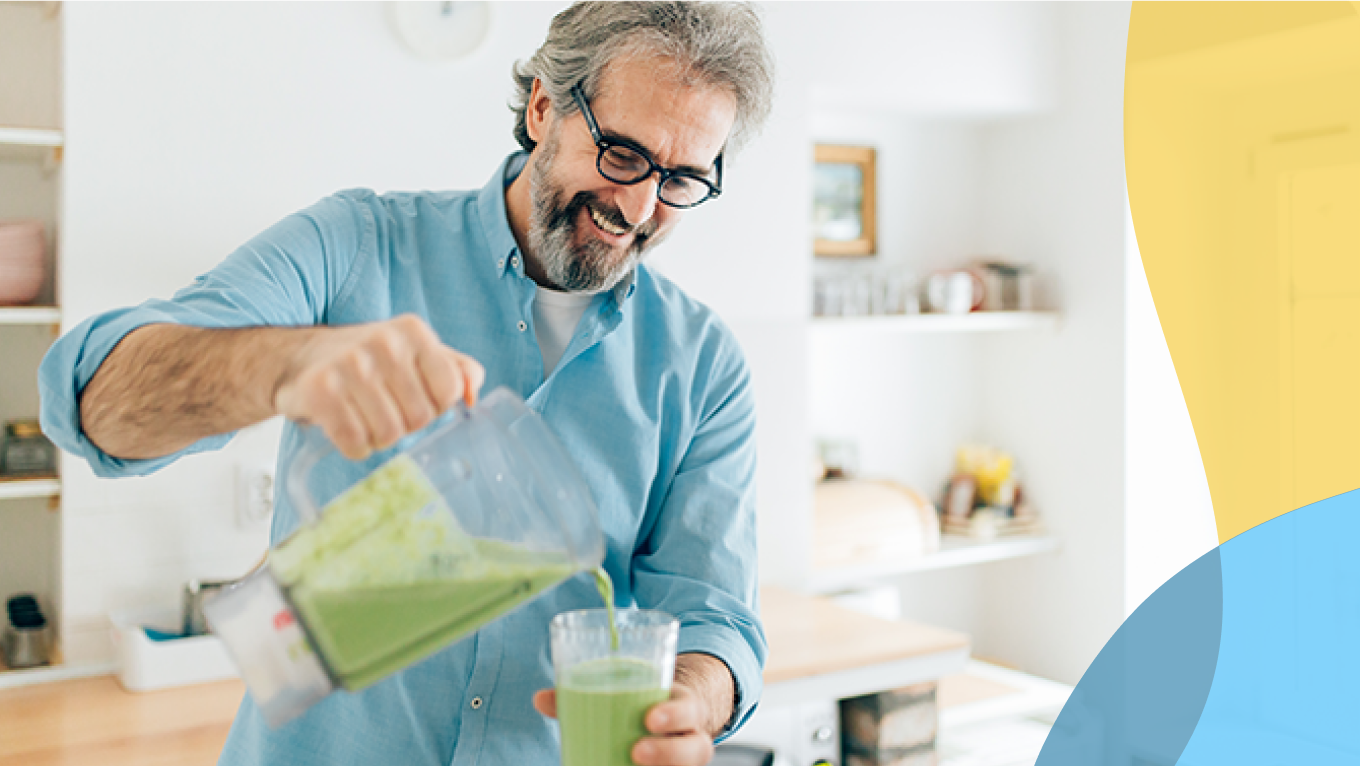
Eating Well During Cancer
Eating well during cancer is an important part of your overall treatment plan. Optimal nutrition helps you maintain a healthy body weight, keep your strength up, and minimize the side effects of treatment. But that doesn’t mean it will come easily.
Some days eating may be enjoyable and others it may feel like a chore. Knowing how and what to eat on those days —without guilt — is just as important as having a plan for the easier days.
Why Nutrition Matters During Cancer Treatment
Meeting your nutritional needs during cancer treatment not only supports your health and immune system. It can also help you keep up your energy so you can do the things you enjoy.
As adults, getting the nutrients our bodies need means choosing calories and protein from a variety of food sources. The Harvard School of Public Health has developed a helpful visual, which shows types and relative amounts of what to include in an average meal.

Translating this visual to real life looks like:
Eating 3 meals and 2-3 snacks or 4-6 mini meals daily
Choosing whole grains and healthy fats like nuts, nut butters, and seeds more often than packaged snacks and foods with added sugar.
Cooking skinless poultry, fish, lean meat, eggs, tofu, legumes, and dairy or non-dairy alternatives rather than processed meats or fast food
Including fruits and vegetables on your plate several times each day
Drinking enough fluids (8-10 cups per day) to stay well hydrated
On days when you’re feeling well, this can be a guide to getting your nutrients. But no matter how well you plan, there may be days during treatment when eating is harder than usual.
Eating On Challenging Days
An upset stomach and stress might make food seem unappealing and side effects from treatment might impact your ability to eat.
Even the best-laid plans require flexibility to account for how you’re feeling day-to-day. This means being gentle with yourself and not judging yourself harshly based on what you are or aren’t consuming on any given day.
So what’s the alternative to avoiding food when it feels like a chore? Glad you asked.
Read on for our top tips to get in your nutrition when you don’t feel like eating…
Eat smaller amounts, more frequently. When you’re not feeling well or dealing with nausea you might find it easier to eat smaller amounts more frequently throughout the day. We call these mini meals and they typically include carbohydrates and a protein. A few easy-to-prep options include:
Crackers with cheese or nut butter
Half of a sandwich (sliced roast turkey, cheese, tuna, chicken, egg or tofu salad)
Greek yogurt mixed with nuts
Cottage cheese with crackers or fruit
An egg and a slice of toast
Use smaller plates. If your usual sized plate of food feels overwhelming, try eating off a smaller plate or bowl. Seeing your food as “smaller” in amount can make it easier to finish.
Add healthy fats and proteins to bulk up foods. Meeting your nutrition needs doesn’t always mean eating more food. Instead, you can choose certain higher calorie foods or add calories to foods you already tolerate well. A few ideas to get you started:
Drizzle olive or avocado oil on vegetables, the top of casseroles or paste, and when you’re cooking eggs
Spread non-hydrogenated tub margarine (i.e., Earth Balance) on both the inside and outside of bread when making grilled cheese sandwiches
Add sour cream to potatoes
Spread peanut butter on apples or bananas
Add hummus to sandwiches or as a dip with veggies
Drink your nutrition. You might find it easier to meet your nutritional needs by supplementing your food intake with high-calorie liquids. Store-bought shakes are an easy option. Look for those that contain at least 300 calories per serving and 12+ grams of protein per serving. Homemade protein shakes are also an option if you prefer to choose your own ingredients.
Prioritize convenience. When eating is unpleasant, preparing food and meals can feel challenging. If possible, set aside time before treatment begins (or in between treatment cycles) to create or pass off a grocery list to someone else. Asking for help preparing meals ahead of time in batches and freezing individual portions makes “cooking” on hard days as easy as reheating.
Eating, while supporting your nutrition and well-being, can also be a great way to be with others. If you’re in an environment and around people that feel relaxing, you’ll likely feel more comfortable trying different options that work for you.
And if you’d like more personalized support schedule an appointment with Iris registered dietitian nutritionist.
This article meets Iris standards for medical accuracy. It has been fact-checked by the Iris Clinical Editorial Board, our team of oncology experts who ensure that the content is evidence based and up to date. The Iris Clinical Editorial Board includes board-certified oncologists and pharmacists, psychologists, advanced practice providers, licensed clinical social workers, oncology-certified nurses, and dietitians.
Copyright © 2026 OncoHealth. All rights reserved. All materials on these pages are the property of OncoHealth. The information and other content on this website are for information purposes only. If you have any questions about your diagnosis or treatment, please seek the advice of your physician or other qualified health care provider(s).
